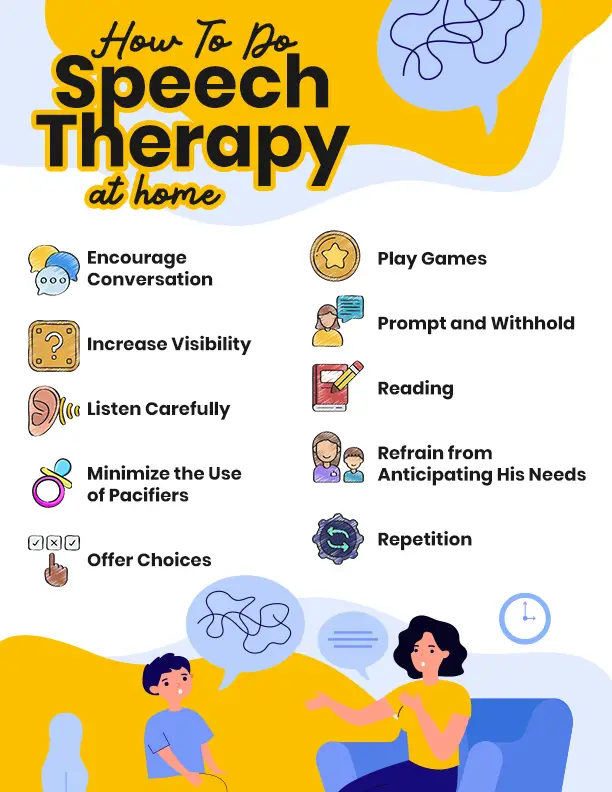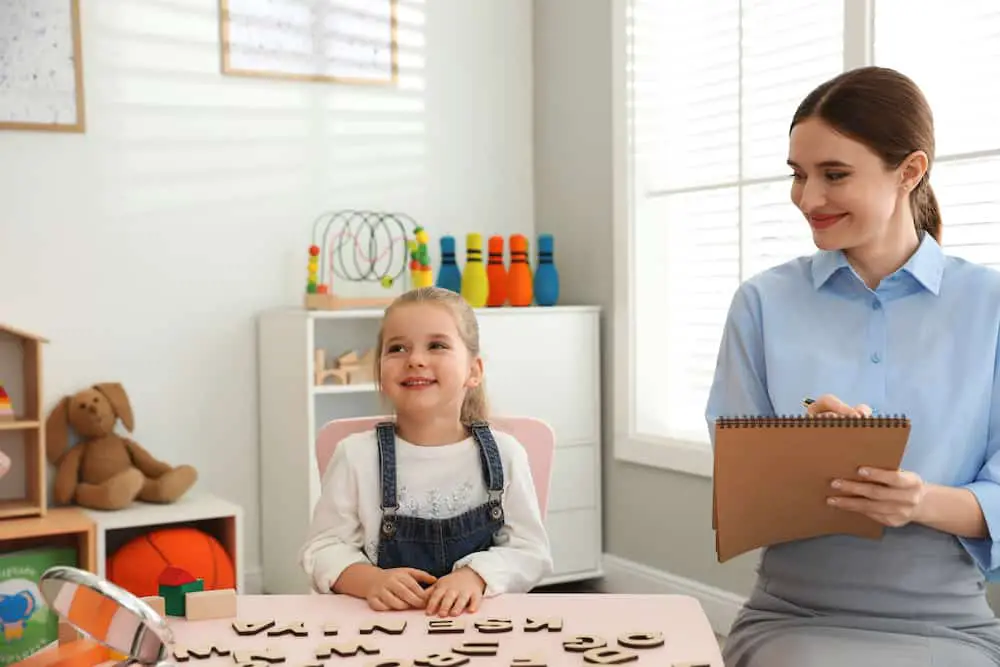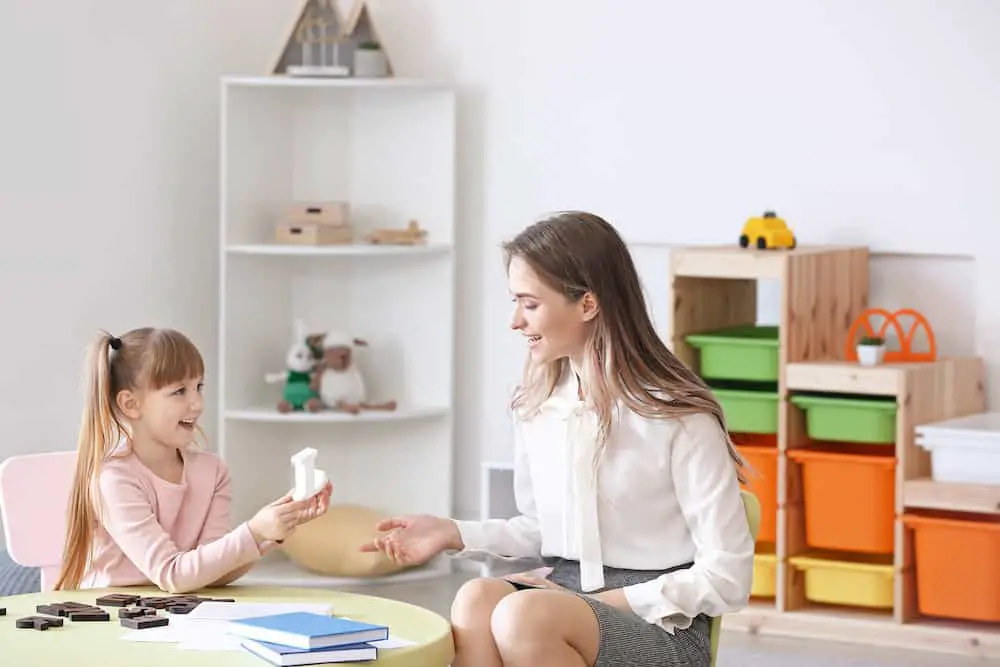Aren’t we all excited when we hear babies make babbling sounds for the first time?
What more when they start to express themselves through words? Most children develop their speech skills at a specific age range.
Unfortunately, some kids show early signs of speech problems that worry parents. The first thing they usually do is talk to someone who can provide a professional assessment of their child.
A speech therapist can help identify the problem and teach you how to do speech therapy at home. You can also use resources like books and toys to assist you with the task.
What Is Speech Therapy?
Let us first understand what speech therapy is before delving into different strategies to address the problem.
Speech therapy is the treatment of speech disorders and communication problems after the child’s evaluation.
It is often conducted by speech-language pathologists, using various exercises, techniques, and other resources.
The goal is to help the child with articulation, comprehension, and fluency.

Evaluate Your Child
Parents will always be the first ones to notice if there is something wrong with their children.
Still, it is always better to seek professional advice.
A doctor can explain further if what you have noticed is something to actually be worried about.
Likewise, a speech therapist will compare your child’s performance with other kids within his age range based on development norms.
Choose a Goal
After identifying your child’s speech concerns, the speech therapist will help you choose which one to work on first.
There are several ways to help your child if he is indeed struggling with speech problems.
However, what will work depends on several factors.
Age
You have to consider your child’s age before deciding on the appropriate technique that will suit him.
Young kids might not have the focus and concentration for traditional therapy.
Instead, they might respond better if it feels like playtime.
On the other hand, an older child may be more inclined to improve his speech, knowing that he will be able to communicate better.
Co-Existing Condition
If your child is only struggling with speech delay, you can do some exercises to help him out.
However, if his speech delay is related to another developmental condition, you need professional intervention.
Temperament
Without a doubt, motivated kids will be more willing to cooperate in practicing their speech with their parents.
However, keep in mind that speech therapy may also negatively affect your child, especially when not done properly.
Type of Speech Involvement Required
Every child is unique, and so is the condition of each one. Hence, it would be best if you use a different technique for each kid.
Your child’s doctor will give you an idea of what you should be focusing on to help improve your kid’s speech issues.
Choose an age-appropriate exercise that will not be too challenging for him.
You can even start from something he is good at to avoid feelings of frustration right off the bat.
Also, some speech therapists suggest that shorter but frequent therapy sessions are more effective for children.

How To Do Speech Therapy at Home
If you are ready to start, you will find various at-home approaches to help improve your child’s speech. Here are a few you can try:
1. Encourage Conversation
Have storytelling sessions regularly and ask open-ended questions instead of the yes or no ones.
Asking kids thought-provoking questions will activate their imagination and encourage them to express their ideas.
2. Increase Visibility
Hold the object near your mouth as you say its name, allowing your child to see how your mouth moves.
This practice helps create word and visual association, teaching your child how to form the words with his mouth.
3. Listen Carefully
Give your full attention to your kids whenever they speak and listen intently to what they are saying.
Respond accordingly to encourage them to speak up more and to let them know that you are listening.
4. Minimize the Use of Pacifiers
Some toddlers, or even preschoolers, still use pacifiers.
It’s a habit that is not only hard to break but will also hinder them from talking.
It is best to gradually wean your child from always having a pacifier in his mouth so that he can learn to use his mouth for speaking.
5. Offer Choices
Instead of asking your child what they want, try to rephrase the question by letting him choose from different options.
This strategy is perfect for a child who is just starting to associate words with things as he builds his vocabulary.
It is more beneficial for your child to hear you say the options and let him verbalize his choice.
6. Play Games
Most children learn faster through play.
It is a great way to stimulate their imagination and keep them excited enough to communicate.
7. Prompt and Withhold
Sometimes, your child struggles because you are not giving him the chance to practice his speech.
Allow your child to figure things out for himself but not to the point of giving him a hard time until he cries.
In other words, let him learn how to communicate what he wants instead of relying on you entirely.
8. Reading
Probably one of the most important activities you can do with your kids is reading together.
For younger children, you can ask them about the pictures in the book and engage them in some discussion about it.
On the other hand, indulge older children in remembering a scenario similar to what you have read.
Sometimes, kids want to read the same story over again. Indulge them, as this will give them a sense of familiarity.
They will also remember words that will help them improve their vocabulary.
9. Refrain from Anticipating His Needs
Most of the time, parents automatically respond and give in to their child’s needs without waiting for them to speak up.
Instead of doing this, encourage them to say what they want using the right words for the specific item.
10. Repetition
Kids, even adults, learn things faster through repetition.
Every time your child utters a word correctly, encourage him by repeating it in a happy and positive tone.
Do the same thing when he says a word incorrectly. This way, he can hear how he said it and realize his mistake.
Conclusion
Being able to express themselves is an important skill everyone needs to succeed in life.
Parents must nurture this skill in their children from the start.
The activities you try to do with your kids at home, combined with positive reinforcements, will significantly help their development.
Still, don’t hesitate to seek professional help the first time you notice anything unusual with your child.
As they say, prevention is better than cure.
Learn different ways how to do speech therapy at home in addition to what professionals are doing.
This strategy will speed up the process of improving your child’s speech skills.

